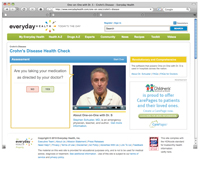Everyday Health is launching a condition-based “virtual doctor” feature for patients with chronic conditions that emphasizes compliance.
The widget, featuring emergency physician, teacher and author Stephen Schueler, MD, goes live in February with the name “One on one with Dr. S.” Everyday Health has lined up four top-10 pharma sponsors for modules in five categories, including Crohn’s disease, heart disease, bipolar disorder, asthma and depression (Everyday Health declined to name sponsors). More conditions could be added in the future.
Dr. Schueler, also starring in a non-condition based checker the site launched in October, appears in swatches of video as a sort of medical Max Headroom, asking the patient questions to establish key indicators (“Are your symptoms getting worse? Do you have new or worsening joint or eye pains? Do you know the foods that can trigger your symptoms? Do you keep a food diary?”) and reinforce the importance of compliance with treatment regimens (“Are you taking your medications as directed?”).
“We wanted to make it as lifelike as possible, to be more real time and capture the dynamic of the physician’s office,” said Dr. Schueler.
After answering a battery of questions, users get a recommendation on what type of doctor they should see and how quickly, along with a list of recommendations and observations they can print out and take in with them.
“We’re trying to find and flag all these things you could be doing wrong,” from lifestyle issues such as smoking, exercise and diet to medication and compliance problems, said Dr. Schueler. “Every disease process is going to have a different list.”
Dr. Schueler has designed symptom checkers used by the University of Central Florida and the Veteran’s Administration, along with call center applications in Switzerland and Chile. In a review of their version of the symptom checker, used to triage healthcare for college students, UCF researchers found “high use and good accuracy of web-based triage,” which directed most users to seek care within 24 hours but advised self-care for 23%. Sore throats were the top complaint, comprising 14% of cases.
“We’re trying to facilitate patient care, to get them into the right place at the right time,” said Schueler. “Nobody wants to treat a cold in the ER, see a heart attack in the office or manage a stroke online.”








